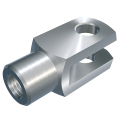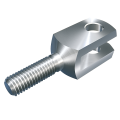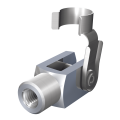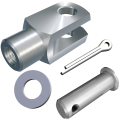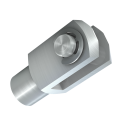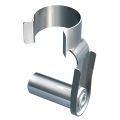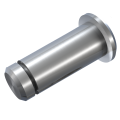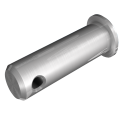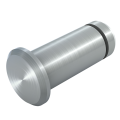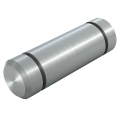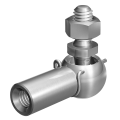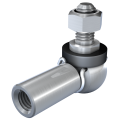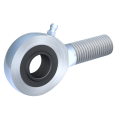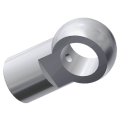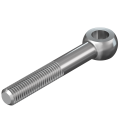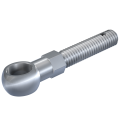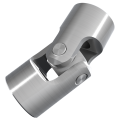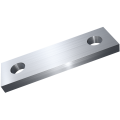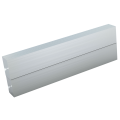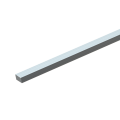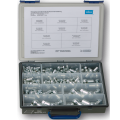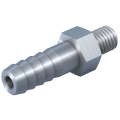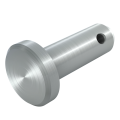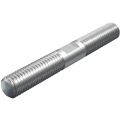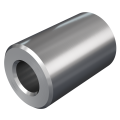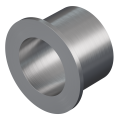Condiciones Generales de Contratación (CGC)
CGC - Clientes particulares
(Versión: 15/07/2022)
Estipulación 1. Ámbito de aplicación
Las siguientes Condiciones Generales de Contratación (CGC tienda en línea - B2C) regulan, de forma concluyente, la relación contractual entre la vendedora mbo Osswald GmbH & Co KG, Steingasse 13, D-97900 Kuelsheim-Steinbach (Tel. +49 (0) 9345/670-0, Fax +49 (0) 9345/6255, info@mbo-osswald.de) y el comprador correspondiente. Con “relación contractual” se entiende cualquier contrato que se celebre a través de la tienda en línea de la vendedora y, en virtud del cual, la vendedora se compromete a suministrar mercancía y a prestar servicios al comprador. El comprador confirma expresamente, al hacer su pedido, que conoce estas CGC de la vendedora y las acepta.
Los compradores pueden ser únicamente consumidores. Un consumidor es cualquier persona física que firma un negocio jurídico con fines que, predominantemente, no están relacionados ni con su actividad comercial ni con su actividad profesional por cuenta propia (art. 13 del Código Civil alemán [Bürgerliches Gesetzbuch, BGB]).
Por la presente, se rebaten las condiciones propias del comprador, a no ser que se haya acordado algo diferente por escrito entre la vendedora y el comprador.
Estipulación 2. Objeto del contrato
El objeto del presente contrato es la venta de mercancía por parte de la vendedora al comprador en el portal de Internet https://www.mbo-osswald.de/es.
Quedan excluidos los requisitos y las peticiones especiales del comprador con respecto a la fabricación de la mercancía según las especificaciones del cliente.
Estipulación 3. Celebración del contrato, idioma del contrato y texto contractual
El comprador puede pedir mercancía a la vendedora en la tienda en línea. Para ello, en primer lugar, debe registrarse y hacerse una cuenta de cliente. Después, podrá pedir mercancía en la tienda en línea de la vendedora especificando sus datos personales. Para ello, primero, reunirá dicha mercancía en el carrito de la compra virtual y, a continuación, seguirá y concluirá el proceso automatizado de pedido en la tienda en línea de la vendedora.
Tras concluir el pedido por parte del comprador, la vendedora enviará un acuse de recibo automatizado del pedido a la dirección de correo electrónico del comprador en el que volverá a detallarse el pedido del comprador. El acuse de recibo del pedido no representa la aceptación del encargo del comprador al firmarse un contrato de compraventa; por tanto, no se efectúa un contrato de compraventa con el acuse de recibo del pedido. Además, el acuse de recibo del pedido no supone ninguna confirmación de la disponibilidad de la mercancía solicitada.
El contrato de compraventa únicamente se concretará con el envío de una confirmación de expedición por correo electrónico por parte de la vendedora al comprador.
El idioma disponible para la celebración del contrato es el alemán. El texto contractual será guardado por la vendedora y, tras concluir el proceso de pedido, el comprador podrá solicitarlo e imprimirlo a través de su cuenta de cliente.
Estipulación 4. Pasos técnicos para celebrar el contrato, reconocer y corregir los errores al introducir los datos
En este caso, el comprador debe dar los siguientes pasos técnicos:
- Tras seleccionar los productos deseados, debe hacer clic en el botón “Pasar por caja” en el carrito de la compra que se muestra
- Aparecerá un resumen de la dirección de facturación y de entrega. En este punto, si la dirección de facturación y la de entrega no son la misma, usted podrá añadir una dirección de entrega aparte, así como modificar la dirección de facturación que había indicado en el registro y consignado en su cuenta
- Seguidamente, se mostrará un resumen de todos los artículos seleccionados. En este apartado, tiene la posibilidad de cambiar el contenido del carrito de la compra
- Será redirigido a la página “Pago y envío” y, allí, deberá escoger tanto el tipo de pago como el de envío. A continuación, deberá hacer clic en “Siguiente”
- Concluirá el pedido haciendo clic en el botón “Finalizar pedido”
El comprador puede corregir los datos de su pedido con las funciones habituales del ratón y el teclado, y mediante los enlaces “Cambiar” disponibles en la página donde aparece resumido el pedido. Asimismo, el comprador también puede corregir los datos de su pedido navegando con la ayuda del botón “Atrás” de su navegador de Internet o haciendo clic en los pasos del pedido que se muestran en la parte superior de la tienda en línea regresando a los pasos del pedido en cuestión.
Estipulación 5. Gestión contractual, gastos de envío y entrega
Cualquier información sobre precios se refiere a precios brutos en euros más, en caso de que sea necesario, posibles gastos de envío y embalaje.
El comprador puede ver estos posibles gastos de envío, que asume desde la localidad donde se halla la sucursal de la vendedora, en la tabla de gastos de envío de la vendedora a la que se puede acceder mediante un enlace en la tienda en línea, así como en la lista de precios del carrito de la compra virtual.
Tras la firma del contrato de compraventa y el pago total del precio de compra, la vendedora se compromete a enviar inmediatamente la mercancía al comprador por correo postal.
Si el comprador lo solicita, la vendedora tiene autorización para asegurar la mercancía por cuenta del comprador, pero no está obligada a ello.
El plazo de entrega es de máximo 3 días hábiles a partir de la recepción de la confirmación del envío para envíos dentro de Alemania. En el enlace “Gastos de envío” de la tienda en línea, la vendedora informa de los distintos plazos de entrega (por ejemplo, en el caso de un envío al extranjero).
Si se diera el caso de que no se puede entregar un artículo pedido porque a la vendedora su proveedor no le hace la entrega necesaria para ello (sin que sea culpa de esta), a pesar de estar obligado a ello por contrato, esta estará autorizada a rescindir el contrato. En este caso, la vendedora informará inmediatamente al comprador de que la mercancía pedida ya no está disponible y enseguida le reembolsará cualquier posible contraprestación ya efectuada.
Al comprador se le ruega que, en el momento de la entrega o tras la recepción, compruebe que la mercancía no tiene daños visibles debidos al transporte o le faltan piezas y, sobre todo, que avise a la vendedora de los daños debidos al transporte que puedan detectarse claramente. Además, al comprador se le ruega que le exija a la empresa transportista que le confirme por escrito los posibles daños en el embalaje de la mercancía y que envíe dicha confirmación a la vendedora. Las reclamaciones legales correspondientes a la garantía del comprador no se verán afectadas en absoluto por ello.
En el supuesto de que la vendedora o sus proveedores no puedan cumplir los plazos acordados por causa de algún obstáculo temporal, no imputable a estos, que impida realizar la prestación, por ejemplo, fuerza mayor, conflictos laborales, catástrofes naturales, escasez energética y de materias primas o incidentes de tráfico insalvables, el plazo será ampliado el tiempo correspondiente que durara el obstáculo temporal que impedía realizar la prestación y, en tal caso, la vendedora informará sin demora al comprador.
Aviso para usuarios finales según la ley alemana de envases y embalajes
Conforme a la ley alemana de envases y embalajes, el vendedor está obligado a retirar los envases y embalajes no sujetos a participación en un sistema de gestión de residuos a los efectos del artículo 15 párrafo 1 frase 1 de la dicha ley y a procurar su reutilización o reciclaje a fin de incrementar la tasa de devolución y promover la máxima reducción posible de los materiales de envase y embalaje generados.
Aquí se incluyen los siguientes envases y embalajes:
- Envases y embalajes de transporte (se consideran envases y embalajes de transporte aquellos que facilitan el transporte de mercancías de modo que se eviten su contacto directo y daños de transporte y que, por lo general, no están previstos para entregarse al usuario final)
- Envases y embalajes de venta y secundarios eliminados generalmente por los usuarios finales particulares como residuo tras el uso
- Envases y embalajes de venta y secundarios que, debido a los riesgos por sustancias nocivas y/o para la salud, no son aptos la participación en un sistema en caso de reciclaje
- Envases y embalajes de venta de materiales de relleno que contienen sustancias nocivas
- Envases y embalajes reutilizables (se consideran envases y embalajes reutilizables aquellos concebidos y destinados a reutilizarse varias veces tras su uso para la misma finalidad y cuya devolución y reutilización reales se posibilitan mediante una logística acorde y se fomentan mediante sistemas de incentivos , por lo general, por medio de un depósito)
Por consiguiente, el vendedor está obligado a retirar de forma gratuita dichos embalajes y envases en el lugar de la entrega real o en su cercanía inmediata. Si no fuera posible, el comprador tiene la posibilidad de devolver al vendedor los envases y embalajes. En este caso, el vendedor se encargará de su reciclaje.
Conforme al artículo 12, párrafo 1 de la ley alemana de envases y embalajes, las regulaciones legales de dicha ley no son aplicables para envases y embalajes entregados a usuarios finales particulares fuera de Alemania.
Puede consultar más información y opciones de contacto en caso de duda en Avisos relativos a la ley de envases y embalajes.
Estipulación 6. Facturación
Al comprador se le facturará de forma electrónica siempre y cuando no se haya acordado otra cosa con él. La factura se enviará por correo electrónico.
Estipulación 7. Derecho de revocación y consecuencias jurídicas al ejercer el derecho de revocación
De acuerdo con las disposiciones legales, los consumidores disponen de un derecho de revocación. Se puede obtener información más detallada sobre el derecho de revocación en la información sobre el derecho de revocación de la vendedora.
Estipulación 8. Responsabilidad
La vendedora se responsabiliza ilimitadamente de daños provocados intencionadamente u ocasionados por negligencia grave, en caso de que se oculten defectos de manera fraudulenta, en caso de asumir una garantía de calidad, de exigencias según la Ley alemana de Responsabilidad por el Producto [Produkthaftungsgesetz], así como de la vulneración de la vida, la integridad física o la salud.
La vendedora no se responsabilizará de otros daños si estos han sido causados por ella misma, por un representante legal o por auxiliares ejecutivos por negligencia leve. La vendedora se responsabilizará de forma limitada, por daños, de la vulneración de obligaciones contractuales esenciales cuyo cumplimiento es fundamental, a fin de cuentas, para la correcta ejecución del contrato y en cuya observancia debe confiar el comprador reiteradamente (obligaciones contractuales fundamentales), indemnizando por los daños previsibles típicos del contrato, en caso de que estos hayan sido ocasionados por negligencia leve.
Los acuerdos previos son válidos para cualquier derecho a indemnización por daños y perjuicios, sobre todo para la indemnización aparte de la prestación y la indemnización en lugar de la prestación, y esto independientemente de cuál sea el fundamento jurídico, especialmente a causa de defectos, de la vulneración de obligaciones derivadas de la relación de deuda o de una actuación ilícita.
Los acuerdos legales que someten a la vendedora a una responsabilidad sin culpa debido a ciertas actuaciones u omisiones no se verán afectados por las exclusiones y limitaciones de responsabilidad anteriores.
Estipulación 9. Garantía
La vendedora se responsabilizará fundamentalmente de defectos de la mercancía conforme a las disposiciones legales del Derecho de Compraventa alemán [Kaufrecht] (artículo 434 y ss. del Código Civil alemán [Bürgerliches Gesetzbuch, BGB]). No obstante, siempre que se trate de un contrato relativo a productos digitales a los efectos del artículo 327 párrafo 2 del Código Civil alemán, son aplicables las disposiciones para contratos relativos a productos digitales (artículo 327 y siguientes del Código Civil alemán).
Estipulación 10. Condiciones de pago, demora y reserva de propiedad
El precio de compra es pagadero inmediatamente después de la conclusión del contrato de compraventa. El pago se efectuará, a elección del comprador, mediante pago por factura, pago por adelantado/transferencia, tarjeta de crédito o PayPal.
El comprador incurrirá en demora a los 30 días después del vencimiento, cuando se le haya advertido de esta consecuencia en la factura o en el requerimiento de pago. Si el comprador se demorara en el pago, durante dicha demora deberá pagarse un 5 % de interés sobre el precio de compra por encima del tipo de interés básico. La vendedora se reserva el derecho a justificar perjuicios mayores por demora y a hacerlos valer frente al comprador.
La mercancía entregada seguirá siendo propiedad de la vendedora hasta el pago íntegro de la misma.
Estipulación 11. Protección de datos
Al comprador se le advierte de que la vendedora almacenará en soportes informáticos de datos y procesará los datos personales de este que sean necesarios para la tramitación de la orden y del pedido. Asimismo, estos se transmitirán también al proveedor de servicios de pago PayPal únicamente con la finalidad antes mencionada consistente en tramitar la orden y el pedido. No se efectuará expresamente ninguna transmisión de estos datos a terceros con otros fines (por ejemplo, fines publicitarios).
El comprador podrá obtener más pormenores, también sobre sus derechos como parte interesada, en la política de protección de datos de la vendedora.
Estipulación 12. Disposiciones finales
A las presentes condiciones generales de contratación y al contrato de compraventa celebrado respectivamente se les aplicará únicamente el Derecho alemán, excluyendo la Convención de las Naciones Unidas sobre los contratos de compraventa internacional de mercaderías. Esto solo se aplicará en la medida en que la protección concedida no se retire por disposiciones obligatorias del Derecho del Estado en el que el consumidor tenga su residencia habitual.
Si una o varias cláusulas de estas condiciones de contratación no fueran efectivas en su totalidad o en parte, la validez del resto de disposiciones no deberá verse afectada por ello.
Estipulación 13. Información sobre el portal de la Comisión Europea para facilitar los acuerdos amistosos en línea y las alternativas de acuerdo amistoso
La Comisión Europea proporciona un portal en línea para facilitar los acuerdos amistosos (“Plataforma OS”) al que se puede acceder a través del enlace //ec.europa.eu/consumers/odr. Existe la posibilidad de utilizar esta plataforma para llegar a acuerdos amistosos extrajudiciales sobre obligaciones contractuales en contratos de compraventa en línea.
La vendedora no se compromete y, en principio, no está dispuesta a participar en un procedimiento de acuerdo amistoso ante un órgano de arbitraje para consumidores.
(Version: 15.07.2022)
§ 1 Scope
The following General Terms and Conditions (GTC of Sale to Private Customers) are definitive and govern the contractual relationship between the Vendor mbo Osswald GmbH & Co KG, Steingasse 13, 97900 Kuelsheim-Steinbach (Tel. +49 (0) 9345/670-0, Fax +49 (0) 9345/6255, info@mbo-osswald.de) and the respective purchaser. The term contractual relationship means any contract concluded by the Vendor on the basis of which the Vendor is required to provide deliveries of goods and services to the Purchaser. By placing its order, the Purchaser expressly confirms that it is aware of and accepts the Vendor's present General Terms and Conditions.
Purchasers may only be consumers. A consumer is any natural person that enters into a transaction for a purpose that is not primarily attributable to their commercial or their independent professional activity (§ 13 of the German Civil Code (BGB)).
The Purchaser's own terms and conditions are herewith excluded unless agreed to the contrary in writing between the Vendor and the Purchaser.
The Vendor will provide the Purchaser unrequested with a copy of the present General Terms and Conditions. These can also be consulted, downloaded, saved and printed from https://www.mbo-osswald.de/es under "GTC of Sale to Private Customers”.
§ 2 Object of the contract
The object of the respective contract is the sale of goods by the Vendor to the Purchaser and, possibly also, the manufacture and/or adaptation of goods in accordance with the Purchaser's wishes.
§ 3 Offer and conclusion of contract
The Purchaser may submit orders by telephone, fax, e-mail, letter or in person or may send inquiries to the Vendor. Where an order is placed by e-mail, letter, fax or in person, the Purchaser shall receive from the Vendor by e-mail, letter, fax or in person a printed copy of an order confirmation which confirms the conclusion of the contract in text form.
The presentation of the goods and products, in particular on the Vendor's website, in catalogues, brochures and price lists, is non-binding and does not constitute an offer on the part of the Vendor. The same also applies to drawings, illustrations, and weight, price and dimensional specifications. Instead, the Purchaser is required to make an offer.
Contracts concluded via the Vendor's Internet portal https://www.mbo-osswald.de/es are subject to the separate GTC Online Shop - B2C that can be consulted at https://www.mbo-osswald.de/es "CGC tienda en línea - B2C".
§ 4 Execution of the contract, delivery
Goods that are present in stock will be dispatched at the latest 5 working days after the issue of the order confirmation and, in the case of cash payment in advance, following receipt of the full invoice amount. If the goods are not in stock when they are ordered, the Vendor shall manufacture or order the goods, inform the customer and notify the customer of the expected delivery date.
If not all the ordered items are available in stock or are no longer available due to prior sale then the Vendor will make full delivery of all the items at a later time when these become available. The Purchaser shall be notified of the delivery time prior to conclusion of the contract.
If it is not possible to deliver an ordered item because the Vendor has, through no fault of its own and despite the supplier's contractual obligations, not been supplied by its supplier then it is entitled to withdraw from the contract. In this case, the Vendor will immediately inform the Purchaser without delay that the ordered goods are no longer available and reimburse any amounts that have already been paid.
The Purchaser is requested, on delivery or after receipt, to inspect the goods for visible transport damage and, if applicable, missing parts and in particular to notify the Vendor of clearly recognisable transport damage. In addition, the Purchaser is requested to ask the transport company for confirmation of any damage to the packaging of the goods and to send this confirmation to the Vendor. The Purchaser's statutory guarantee rights are fully unaffected by this.
If the Vendor incurs additional shipping costs as a result of having been given an incorrect delivery address and/or an incorrect addressee, these costs shall be refunded by the Purchaser, unless the Purchaser is not responsible for the incorrect details.
If the goods are collected from the Vendor's place of business then delivery shall be made directly against payment for the goods.
If the Vendor or its suppliers are unable to respect agreed deadlines due to temporary impediments to performance for which they are not responsible, such as, for example, force majeure, industrial disputes, natural disasters, shortages of energy or raw materials or insurmountable traffic disruption, then the period will be extended by the duration of the temporary impediment to performance and the Vendor will notify the Purchaser without delay in such cases.
Note for consumers in accordance with applicable packaging legislation
In compliance with packaging legislation, the seller is required to take back non-system-relevant packaging as defined in § 15 paragraph 1 sentence 1 of the German Packaging Act and to ensure its re-use or recycling in order to increase the amount of packaging returned and help minimise the quantities of packaging material generated.
This covers the following packaging types:
- Transport packaging (transport packaging is packaging which simplifies the transportation of goods in a way that avoids direct contact with them and prevents transport damage. Such packaging is not typically intended to be passed on to the consumer)
- Sales and outer packaging which does not typically arise as packaging waste for consumers
- Sales and outer packaging which cannot be considered as system-relevant for the purposes of recycling due to pollutant-related and/or health risk
- Sales packaging containing hazardous goods
- Reusable packaging (reusable packaging is packaging that has been designed and is intended to be reused a number of times for the same purpose following its initial use and whose actual return and re-use is made possible by an adequate logistical solution as well as by suitable incentive systems, as part of which a deposit is generally demanded)
The seller is consequently obliged to take such packaging back free of charge at the location where it is actually handed over or in the immediate vicinity thereof. If this is not possible, the purchaser has the possibility of sending the packaging back to the seller. The seller will then arrange for the recycling of the packaging.
In accordance with § 12 paragraph 1 of the German Packaging Act, the legal provisions of packaging legislation do not apply to packaging that is handed over to private consumers outside of Germany.
Further information and contact details in the event of queries can be found under Avisos relativos a la ley de envases y embalajes.
§ 5 Invoicing
Purchasers will be invoiced electronically unless agreed otherwise with the purchaser. Invoices will be sent by e-mail.
§ 6 Right of revocation and consequences thereof
Right of revocation
As a consumer, the Purchaser has the right to revoke the contract within fourteen days without giving reasons. The revocation period is fourteen days as of the day on which the Purchaser or a third-party nominated by the Purchaser, who is not the carrier, took possession of the last item.
To exercise its right of revocation, the Purchaser must inform the Vendor (mbo Osswald GmbH & Co KG, Steingasse 13, 97900 Kuelsheim-Steinbach, Tel. +49 (0) 9345/670-0, Fax +49 (0) 9345/6255, info@mbo-osswald.de) of the decision to cancel the contract by sending a clear statement to this effect (e.g. a letter sent by post, fax or e-mail). To this end, the Purchaser may use the attached specimen revocation form. However, this is not obligatory.
To observe the revocation period, it is sufficient for the Purchaser to send notification that it is exercising its right to cancel before the end of the revocation period.
Consequences of revocation
If the Purchaser cancels this contract, the Vendor must return to it all payments received from it, including the delivery charges (except for additional costs that arise as a result of the fact that the Purchaser has requested a type of delivery other than the cheapest standard delivery offered by the Vendor), without delay and at the latest within fourteen days of the date on which the Vendor received the notification of the Purchaser's revocation of the contract. To make this reimbursement, the Vendor shall use the same means of payment that was used for the original transaction, unless a different means was expressly agreed with the Purchaser; under no circumstances shall any charges be debited to the Purchaser for this reimbursement.
The Vendor can refuse to make the reimbursement until it has received the returned goods or until the Purchaser has provided proof that it has returned the goods, whichever is earlier.
The Purchaser must send back or hand over the goods to the Vendor without delay and at the latest within fourteen days of the date on which it notified the Vendor of the revocation of this contract. The period is observed if the Purchaser sends the goods before the period of fourteen days has expired.
The Purchaser shall bear the direct costs of returning the goods. The Purchaser is requested to contact the Vendor before sending the goods so that the Vendor can organize all the subsequent steps.
The Purchaser will only be liable for any reduction in the value of the goods if this results from their being treated in a manner other than that necessary in order to ascertain the nature, properties and functioning of the goods.
Exclusion of revocation
The right of revocation does not apply to contracts for the supply of goods which are not prefabricated and whose manufacture is determined by the consumer's individual choice or specification or which are clearly tailored to the personal needs of the consumer. This applies in particular to goods that are individually ordered and produced in accordance with your specifications and requirements via the configurators for bolts according to DIN / EN / ISO (ISO 2340 / DIN 1433 / DIN 1443 / ISO 2341 / DIN 1434 / DIN 1435 / DIN 1436 / DIN 1444 / DIN 1445), bolts with groove, joint rods or threaded rods.
The right of revocation also does not apply to contracts for the supply of goods if these were inseparably combined with other goods after delivery on account of their nature.
§ 7 Prices
All prices are specified as gross prices in euros plus any applicable packaging and shipping costs.
All shipping costs, and in particular packaging, transport costs, transport insurance and delivery costs, as well as, if applicable, customs' duties and taxes, will be borne by the Purchaser unless agreed to the contrary in text form.
The purchase contract or work performance contract is drawn up at the prices applicable at the time the order is placed. The current prices are set out in the price lists applicable at the time and/or in the offer issued by the Vendor, in particular in the case of custom-made products. The prices indicated there are valid for 4 weeks.
§ 8 Payment conditions, arrears and retention of title
The purchase price of the ordered goods shall be due immediately on conclusion of the contract and must be paid in cash in advance against invoice or confirmation of the order, unless purchase on account is agreed.
When paying cash in advance, the Purchaser shall remit the purchase price to the Vendor before the goods are dispatched to it or the service is performed.
In the case of payment on account, invoices are due for payment on receipt of the invoice and reception of the goods (on reception of the final delivery in the case of related orders). The Purchaser shall be in arrears 30 days after the invoice becomes due for payment if it has been informed of this in the invoice or request for payment. If the Purchaser fails to make payment by the due date then interest will be charged on the purchase price at 5% points above the basic interest rate during the period of arrears. The Vendor reserves the right to prove a higher level of loss or damage resulting from the arrears and assert a corresponding claim against the Purchaser.
The Vendor reserves the right to set a minimum invoice value per order. In Germany, this minimum order value is €80 and overseas €150. If the respective minimum invoice value per order is not reached, a surcharge for small quantities of €30 shall be applied to the order value and charged.
The Vendor will not be responsible for any domestic or foreign bank charges and consequently reserves the right to adjust the amounts invoiced in the light of any costs and/or charges accrued. No discounts are granted unless expressly agreed on conclusion of the contract.
The goods shall remain the property of the Vendor until paid for in full.
§ 9 Liability
The Vendor has unlimited liability for loss or damage caused with malicious intent or due to gross negligence, for the fraudulent concealment of defects, the acceptance of warranted properties, claims resulting from product liability legislation as well as in the event of loss of life, physical injury or impairment to health.
The Vendor is not liable for any other loss or damage caused as a result of minor negligence on the part of the Vendor, a legal representative or vicarious agent. In the event of the violation of important contractual obligations whose correct discharge is essential for the execution of the present contract and on the respect for which the Purchaser should be able to rely (cardinal obligation), the Vendor's liability is limited to compensation in respect of loss or damage that is typical of the contract and foreseeable, provided that this is attributable to minor negligence.
The above provisions apply to all claims for loss or damage, in particular when compensation is claimed in addition to performance or when compensation is claimed instead of performance, irrespective of the legal basis and in particular due to defects, the violation of obligations resulting from the contractual relationship and claims based on tort.
The legal provisions under which the Vendor is liable for certain activities or omissions even in the absence of negligence are unaffected by the above exclusions and limitations of liability.
§ 10 Warranty
The Vendor's liability in respect of defective goods is set out in the statutory provisions of German commercial legislation (§§ 434 ff. of the German Civil Code (BGB)).
In the case of the sale of used goods, the expiry period for claims in respect of defective goods in accordance with § 475 para. 2 of the German Civil Code is limited to one year.
The Purchaser must address any claims or complaints in the form of a clear statement (e.g. by telephone, a letter sent by post, fax or e-mail) to:
mbo Osswald GmbH & Co KG, Steingasse 13, D-97900 Kuelsheim-Steinbach, Germany
Tel. +49 (0) 9345/670-0 Fax +49 (0) 9345/6255 info@mbo-osswald.de
§ 11 Custom and one-off articles
Unless expressly agreed to the contrary, no requests to take back or cancel delivery of custom and one-off articles will be entertained. Goods which are manufactured to the Purchaser's particular specifications or are clearly tailored to the Purchaser's personal requirements are considered to be custom or one-off articles.
§ 12 Who we are and how you can contact us
mbo Osswald GmbH & Co KG
Metal processing • Linking technology
Steingasse 13
D-97900 Kuelsheim-Steinbach, Germany
Phone +49 9345 – 6700
Fax +49 9345 – 6255
Email info@mbo-osswald.de
Website www.mbo-osswald.com
District Court - Registration Court Mannheim HRA 570277
VAT No. DE 811933830
General Partner of mbo Osswald GmbH & Co KG:
mbo Osswald Verwaltungs-GmbH
Steingasse 13
D-97900 Kuelsheim-Steinbach, Germany
District Court - Registration Court Mannheim HRB 570358
Legal representatives of mbo Osswald Verwaltungs-GmbH:
Directors:
Dr. Manfred Osswald
Rainer Osswald
Andreas Osswald
Hanna Osswald
§ 13 Concluding provisions
German law, to the exclusion of the UN Convention on Contracts for the International Sale of Goods, is exclusively applicable to the present General Terms and Conditions and the associated concluded purchase contract. This applies only insofar as the protection afforded is not withdrawn due to mandatory provisions under the legislation of the country in which the consumer is regularly resident.
If one or more clauses of these General Terms and Conditions should become fully or partially ineffective then this shall not affect the validity of the remaining provisions.
Los consumidores disponen de un derecho legal de revocación. Un consumidor es cualquier persona física que firma un negocio jurídico con fines que, predominantemente, no pueden atribuirse ni a su actividad comercial ni a su actividad profesional por cuenta propia.
Como consumidor, tiene derecho a revocar este contrato en un plazo de catorce días sin necesidad de alegar ningún motivo. El plazo de revocación es de catorce días a partir del día en el que usted o un tercero designado por usted (que no sea el transportista) haya tomado posesión de la última mercancía.
Para ejercer su derecho de revocación, debe informarnos (mbo Osswald GmbH & Co KG, Steingasse 13, D-97900 Kuelsheim-Steinbach, Tel. +49 (0) 9345/670-0, info@mbo-osswald.de), mediante una declaración inequívoca (por ejemplo, una carta enviada por correo postal, un telefax o un mensaje de correo electrónico), de su decisión de revocar este contrato. Para ello, puede emplear el modelo de formulario de revocación adjunto, pero esto no es obligatorio.
Para hacer valer el plazo de revocación, basta con que envíe el mensaje para ejercer el derecho de revocación antes de que transcurra el plazo de revocación.
Consecuencias de la revocación
Si revoca este contrato, le tendremos que devolver cualquier pago que haya tenido lugar en este contexto que hayamos recibido de usted, incluidos los gastos de entrega (a excepción de los gastos adicionales que resulten de que usted haya escogido otro tipo de entrega diferente a la estándar más económica ofrecida por nosotros), inmediatamente y, a más tardar, en un plazo de catorce días a partir del día en el que nos llegue el mensaje sobre su revocación de este contrato. Para este reembolso, emplearemos la misma forma de pago que usted usó en la transacción original, a no ser que hubiéramos acordado expresamente otra cosa con usted. En ningún caso se le cobrarán tasas por este reembolso.
Podremos negarnos a hacer dicho reembolso hasta que no se nos haya enviado de vuelta la mercancía o hasta que usted no haya probado que ha enviado de vuelta la mercancía, según lo que suceda antes.
Usted deberá enviarnos de vuelta o entregarnos la mercancía inmediatamente y, en cualquier caso, a más tardar, en un plazo de catorce días a partir del día en el que usted nos informe de la revocación de este contrato. Se respetará el plazo si usted envía la mercancía antes de que transcurra el plazo de catorce días.
Nosotros asumimos los gastos directos del reembolso de la mercancía. Le rogamos que, antes de proceder al envío de la mercancía, se ponga en contacto con nosotros y así nos encargaremos de organizar todo lo demás.
Usted solo deberá sufragar una posible pérdida de valor de la mercancía si dicha pérdida de valor se debe a una manipulación de la mercancía que no sea necesaria para comprobar su calidad, sus propiedades y su funcionamiento.
Exclusión de la revocación
El derecho de revocación no se aplicará en el caso de contratos para la entrega de mercancía que no esté prefabricada y para cuya fabricación haya sido decisivo que el consumidor haya hecho una elección o determinación individual, o que esté claramente hecha a medida según las necesidades personales del consumidor. Esto es aplicable, especialmente, en el caso de mercancía que, mediante los configuradores para pernos según DIN/EN/ISO (ISO 2340/DIN 1433/DIN 1443/ISO 2341/DIN 1434/DIN 1435/DIN 1436/DIN 1444/DIN 1445), para pernos con ranura, para barras articuladas o para vástagos roscados, se encarga y produce de forma personalizada según sus datos y sus requisitos.
CGC - Clientes comerciales
(Versión: 15/07/2022)
Estipulación 1. Ámbito de aplicación
Las siguientes Condiciones Generales de Contratación (CGC tienda en línea - B2B) regulan de forma definitiva la relación contractual entre la vendedora mbo Osswald GmbH & Co KG, Steingasse 13, 97900 Kuelsheim-Steinbach (Tel. +49 (0) 9345/670-0, Fax +49 (0) 9345/6255, info@mbo-osswald.de) y el comprador correspondiente. Por relación contractual se entenderá cualquier celebración de un contrato a través de la tienda en línea de la vendedora, en virtud del cual la vendedora esté obligada a realizar suministros de mercancías y servicios al comprador. Al cursar su pedido, el comprador certifica expresamente tener constancia de estas Condiciones Generales de Contratación y aceptarlas.
Los compradores deberán ser exclusivamente empresas. Una empresa es una persona física o jurídica o una sociedad personalista con capacidad jurídica que en el momento de celebrar un negocio jurídico actúa ejerciendo su actividad empresarial o su actividad como profesional autónomo (art. 14 del Código Civil alemán [Bürgerliches Gesetzbuch, BGB]).
Por la presente, nos oponemos a las condiciones propias del comprador, salvo que las partes hayan acordado otra cosa distinta por escrito.
Estipulación 2. Objeto contractual
El objeto del contrato correspondiente es la venta de mercancías por parte de la vendedora al comprador en el portal de internet https://www.mbo-osswald.de/es.
Los deseos especiales e indicaciones del comprador en cuanto a la fabricación de la mercancía conforme a las especificaciones del cliente deberán comunicarse en cada caso por escrito.
Estipulación 3. Celebración del contrato, idioma contractual, texto contractual
El comprador puede pedir mercancías en la tienda en línea de la vendedora, registrándose previamente y creando una cuenta de cliente. Posteriormente, una vez indicados sus datos personales, podrá pedir mercancía de la vendedora en la tienda en línea añadiendo primero mercancías a la cesta de la compra virtual y realizando y finalizando después el proceso de pedido automatizado en la tienda en línea de la vendedora.
Cuando el comprador haya terminado de cursar el pedido, la vendedora enviará una confirmación automática de recepción del pedido a la dirección de correo electrónico del comprador, en la que se indica de nuevo el pedido del comprador. La confirmación de recepción del pedido no representa una aceptación de la solicitud del comprador de celebrar un contrato de compra; por lo tanto, con la confirmación de recepción del pedido no se perfeccionará ningún contrato de compra. Asimismo, la confirmación de recepción del pedido no representa una confirmación de que la mercancía pedida esté disponible para el suministro.
El contrato de compra solo se perfeccionará mediante la remisión de una confirmación de envío por correo electrónico por parte del vendedor al comprador.
Para la celebración del contrato el idioma disponible es el alemán. El texto contractual será guardado por la vendedora y podrá ser consultado e imprimido por el comprador a través de su cuenta de cliente una vez concluido el proceso de pedido.
Estipulación 4. Pasos técnicos para la celebración del contrato, reconocimiento y rectificación de errores en la introducción de datos
El comprador deberá realizar, concretamente, los siguientes pasos técnicos:
- Después de seleccionar los productos deseados, deberá pinchar en “Facturación” en la cesta de la compra que aparece.
- Será remitido a la página “Método de pago & método de envío” y deberá seleccionar allí la forma de pago y la forma de envío; posteriormente, deberá pinchar en “Siguiente”.
- Se muestra un cuadro con la dirección de facturación y la dirección de suministro. Si la dirección de facturación y la dirección de suministro no son idénticas, podrá usted añadir aquí una dirección de suministro por separado y modificar su dirección de facturación indicada en el registro y asignada a su cuenta.
- A continuación, se muestra un resumen de todos los artículos seleccionados. Tiene la opción de modificar aquí el contenido de la cesta de la compra.
- Finalice el pedido pinchando en el botón “Finalizar pedido”.
El comprador podrá corregir los datos de su pedido a través de las funciones habituales del ratón y del teclado y a través de los enlaces “Cambiar”, habilitados en la página de resumen del pedido. Asimismo, el comprador podrá corregir los datos relativos a su pedido navegando hacia atrás hasta los distintos pasos del pedido utilizando el botón “Atrás” de su navegador web o pinchando en los pasos del pedido que figuran en la parte superior de la tienda en línea.
Estipulación 5. Ejecución del contrato, gastos de envío, suministro
Todas las ofertas son sin compromiso. Todos los precios indicados se entienden como precios netos en euros más el IVA que eventualmente se devengue y que se indica por separado en la factura, más los gastos de embalaje y de envío que, en su caso, se devenguen. Los gastos de envío devengados, que serán sufragados por el comprador desde el lugar del establecimiento de la vendedora, pueden ser consultados por el comprador en la tabla de gastos de envío de la vendedora, a la que se accede desde la tienda en línea mediante un enlace, así como en el resumen del precio que figura en la cesta de la compra virtual. El precio indicado para la mercancía correspondiente no incluye prestaciones accesorias de la vendedora (por ejemplo, puesta a disposición, montaje, instalación o ejecución) ni costes accesorios (por ejemplo, embalaje, cajas de cartón, gastos de transporte, costes de envío, aranceles, flete, impuestos y gastos de seguro).
La vendedora se obliga a enviar sin demora la mercancía por correo postal al comprador después de la celebración del contrato de compra y del pago íntegro del precio de compra.
El suministro se efectúa siempre por riesgo y cuenta del comprador. Si así lo exigiera el comprador, la vendedora tendrá derecho, si bien no está obligada, a asegurar la mercancía a cargo del comprador.
Desde el momento de la celebración del contrato, el plazo de suministro será de un máximo de 3 días hábiles en el caso del envío dentro de Alemania. A través del enlace “Gastos de envío”, habilitado en la tienda en línea, la vendedora advierte acerca de otros plazos de suministro distintos (por ejemplo, en caso de envío al extranjero).
Si algún artículo pedido no estuviera disponible para su suministro porque la vendedora no hubiera recibido el suministro por parte de su proveedor o no lo hubiera recibido a tiempo, si se tratase de un negocio a plazo fijo, sin mediar culpa por parte de la vendedora y a pesar de la obligación contractual del proveedor, existiendo así un obstáculo no solo temporal para realizar la prestación, la vendedora tendrá derecho a desistir del contrato. En este caso, la vendedora informará sin demora al comprador de que la mercancía pedida ya no está disponible y reembolsará sin demora las contraprestaciones que ya hayan sido satisfechas.
En el supuesto de que la vendedora o sus proveedores no puedan cumplir los plazos acordados por causa de algún obstáculo temporal, no imputable a estos, que impida realizar la prestación, por ejemplo, fuerza mayor, conflictos laborales, catástrofes naturales, escasez energética y de materias primas o incidentes de tráfico insalvables, el plazo será ampliado el tiempo correspondiente que durara el obstáculo temporal que impedía realizar la prestación y, en tal caso, la vendedora informará sin demora al comprador.
Aviso para clientes industriales según la ley alemana de envases y embalajes
A fin de incrementar la tasa de devolución, el vendedor está obligado a retirar de forma gratuita los envases y embalajes no sujetos a licencia que obraran en poder del comprador. Aquí se incluyen envases y embalajes de transporte (también palés) y envases y embalajes secundarios no destinados a eliminarse como residuo por el comprador, al igual que el resto de envases y embalajes contemplados en el artículo 15 de la ley alemana de envases y embalajes. La obligación de retirada del vendedor rige para envases y embalajes vacíos de todo tipo, forma y tamaño como los recibidos originalmente por el comprador y que proceden de mercancías incluidas en el programa de productos del vendedor.
La devolución puede efectuarse mediante entrega gratuita in situ. En el caso de entregas recurrentes, el comprador también podrá devolver de forma gratuita el envase o embalaje con la siguiente entrega.
Puede consultar más información y opciones de contacto en caso de duda en Avisos relativos a la ley de envases y embalajes.
Estipulación 6. Facturación
Al comprador se le facturará de forma electrónica siempre y cuando no se haya acordado otra cosa con él. La factura se enviará por correo electrónico.
Estipulación 7. Responsabilidad
La vendedora responderá ilimitadamente por daños causados cuando haya mediado dolo o negligencia grave, cuando haya ocultado maliciosamente la existencia de vicios, cuando haya asumido una garantía por unas características determinadas, así como por reclamaciones en virtud de la Ley alemana sobre productos defectuosos [Produkthaftungsgesetz] y por daños contra la vida, la integridad física o la salud.
La vendedora no responderá de otros daños, si estos han sido causados por la vendedora, por un representante legal o por personal auxiliar mediando solamente negligencia leve. Respecto a la vulneración de obligaciones contractuales esenciales, cuyo cumplimiento es el que hace posible la debida ejecución del contrato y en cuya observancia el comprador debe poder confiar (obligaciones cardinales), la vendedora responderá de forma limitada por daños, realizando una compensación por el daño previsible típico conforme al tipo de contrato, siempre que el mismo haya sido causado mediando negligencia leve.
Las reglamentaciones precedentes rigen para todas las pretensiones de indemnización por daños y perjuicios, especialmente, para las indemnizaciones por daños y perjuicios a satisfacer adicionalmente a la prestación y para las indemnizaciones por daños y perjuicios a satisfacer en lugar de la prestación, sea cual sea la causa jurídica, en particular, por vicios, por la vulneración de obligaciones derivadas de la relación obligacional o por acto ilícito.
Las precedentes exclusiones y limitaciones de responsabilidad no afectarán a las reglamentaciones legales que sometan a la vendedora por determinados actos u omisiones a una responsabilidad sin culpa.
Estipulación 8. Garantía
Por norma general, la vendedora responderá de los vicios de las mercancías con arreglo a las disposiciones legales del Derecho de compraventa (arts. 434 y ss. del Código Civil alemán [Bürgerliches Gesetzbuch, BGB]).
Las pretensiones en virtud del art. 437 del BGB prescriben en el plazo de un año desde el momento en que la mercancía pedida sea suministrada al comprador, siempre que la mercancía no sea un objeto de segunda mano. El plazo de garantía acortado no será válido para las pretensiones del comprador, de las que la vendedora deba responder ilimitadamente conforme a la estipulación 6 de estas Condiciones Generales de Contratación. Lo anterior sin perjuicio de los plazos de prescripción de los arts. 438, apartado 1, n.º 1 y 2, 479, apartado 1, y 634 a, apartado 1, n.º 2, del BGB. En todos los demás casos, regirá el plazo de garantía legal desde el momento en que la mercancía pedida sea suministrada al comprador.
A la vendedora le corresponde el derecho a elegir entre la subsanación del vicio o el suministro posterior de un objeto libre de vicios, con arreglo al art. 439, apartado 1, del BGB.
Los eventuales derechos de regreso en virtud del art. 445a del BGB prescriben asimismo en el plazo de un año desde el momento del suministro de la mercancía pedida.
En el caso de la mercancía suministrada reemplazada o reparada, el plazo de prescripción solo empezará a contar de nuevo si la vendedora ha reconocido la deficiencia de la mercancía suministrada reemplazada o reparada.
En la medida en que se trate de un negocio mercantil bilateral en el sentido del Código de Comercio alemán [Handelsgesetzbuch], el comprador examinará sin demora la mercancía pedida después de que le sea suministrada. Esto rige, especialmente, con miras a que la mercancía esté completa y a la correspondiente capacidad de funcionamiento. Los vicios que se constaten en ese momento o que sean constatables sin más, deberán ser notificados a la vendedora sin demora. Asimismo, es preciso adjuntar una descripción detallada de los vicios. Si el comprador omite realizar dicha notificación, se entenderá que la mercancía ha sido aprobada, a no ser que se trate de un vicio que no era reconocible en el momento del examen.
Los vicios de las mercancías que no sean constatables en el marco del debido examen, conforme a lo establecido en el párrafo anterior, deberán ser notificados sin demora a la vendedora en cuanto sean descubiertos, siempre que se trate de un negocio mercantil bilateral; en caso contrario, se considerará que la mercancía ha sido aprobada, incluso teniendo en cuenta dicho vicio.
Estipulación 9. Condiciones de pago, demora y reserva de propiedad
El pago del precio de compra vencerá inmediatamente después del perfeccionamiento del contrato de compra. A elección del comprador, el pago se efectuará por factura, por adelantado/transferencia, mediante tarjeta de crédito o PayPal.
El comprador incurrirá en mora si no satisface el pago en los 30 días siguientes al vencimiento. Si el comprador incurre en mora con el pago, se devengarán durante el período de la mora unos intereses de 9 puntos porcentuales por encima del tipo de interés base sobre el precio de compra. La vendedora se reserva el derecho de demostrar y hacer valer frente al comprador que sus daños por mora son mayores.
Hasta que se satisfaga el pago íntegro de la mercancía suministrada, esta seguirá siendo propiedad de la vendedora.
La propiedad de la mercancía comprada solo pasará de la vendedora al comprador cuando el comprador haya satisfecho todas las deudas derivadas de la relación comercial con la vendedora (reserva de propiedad ampliada). El comprador se obliga a tratar la mercancía con cuidado y, en el caso de los bienes de elevado valor, se obliga a asegurar estos en beneficio de la vendedora contra los riesgos habituales (por ejemplo, agua, fuego, tormenta, hurto).
Hasta el momento de la transmisión completa de la propiedad, el comprador se obliga a informar inmediatamente a la vendedora en caso de que la mercancía sea embargada o esté expuesta a cualesquiera otras intervenciones de terceros.
El comprador tiene derecho a revender en el curso normal de los negocios la mercancía suministrada que esté bajo reserva de propiedad, siempre y cuando el comprador no se encuentre en situación de mora. El comprador cede a la vendedora todos los derechos de crédito derivados de la reventa frente a un comprador o frente a terceros en virtud del establecimiento de una relación de cuenta corriente en garantía de todos los demás derechos de crédito derivados de la relación comercial. Tras la cesión el comprador queda autorizado para el cobro de los derechos de crédito cedidos a la vendedora. Pero la vendedora se reserva el derecho de revocar la autorización para el cobro y cobrar ella misma el derecho de crédito en caso de que el comprador no atienda a sus obligaciones de pago, se encuentre en situación de mora y, especialmente, si se ha presentado una solicitud de apertura de un procedimiento de insolvencia.
Si se extingue la reserva de propiedad de la vendedora sobre una mercancía adquirida en el comercio mercantil por causa de su reventa, unión o procesamiento por parte del comprador de la mercancía comprada, el lugar de la mercancía comprada será ocupado por la cosa nueva o por el derecho de crédito que nazca en virtud de alguno de los actos indicados (reserva de propiedad de plazo extendido).
Estipulación 10. Derechos protegidos
La vendedora asume en la República Federal de Alemania la responsabilidad frente al comprador de que la mercancía está libre de derechos de terceros. Sin embargo, la condición para ello es que el comprador informe sin demora a la compradora acerca de pretensiones derivadas de la vulneración de derechos protegidos que terceras personas reclamen frente al comprador y que con respecto al tratamiento de las pretensiones y a la persecución de sus derechos actúe de mutuo acuerdo con la vendedora. Si no se cumple alguna de estas condiciones, la vendedora quedará exenta de su obligación.
En el supuesto de que el comprador realice modificaciones en la mercancía suministrada y que por ello se vulneren los derechos protegidos de un tercero, quedará suprimida la responsabilidad de la vendedora.
Estipulación 11. Protección de datos
Se advierte al comprador de que sus datos personales necesarios para la ejecución de la orden y del pedido son guardados en soportes de datos y tratados por la vendedora. La transmisión al proveedor de servicios de pago PayPal se efectúa también exclusivamente con la finalidad mencionada de ejecutar la orden y el pedido. Se hace constar expresamente que no tendrá lugar una transmisión de datos a terceros con fines distintos (por ejemplo, fines publicitarios).
Para más información, también acerca de sus derechos como interesado, el comprador podrá consultar la política de protección de datos de la vendedora.
Estipulación 12. Disposiciones finales
Las presentes Condiciones Generales de Contratación y el correspondiente contrato de compra celebrado se regirán exclusivamente por la legislación alemana, con exclusión de la Convención de las Naciones Unidas sobre los contratos de compraventa internacional de mercaderías.
Como fuero jurisdiccional competente para todas las reclamaciones derivadas de estas condiciones o relacionadas con las mismas y para toda la relación jurídica entre las partes contratantes se pactan los jueces y tribunales del domicilio de la vendedora. Sin embargo, la vendedora podrá, a su discreción, presentar reclamaciones contra el comprador también en otros fueros jurisdiccionales legalmente admisibles.
Para los contratos/acuerdos celebrados en virtud de estas Condiciones Generales de Contratación regirá la forma escrita; no existen pactos accesorios. Cualquier modificación y complementación, así como cualquier modificación de esta cláusula, precisarán de un acuerdo por escrito.
Si una o varias cláusulas de estas Condiciones Generales de Contratación fueran total o parcialmente nulas, esto no afectará a la validez de las estipulaciones restantes.
(Version: 15.07.2022)
§ 1 Scope
The following General Terms and Conditions (CG de Venta - Clientes comerciales) are definitive and govern the contractual relationship between the Vendor mbo Osswald GmbH & Co KG, Steingasse 13, 97900 Kuelsheim-Steinbach (Tel. +49 (0) 9345/670-0, Fax +49 (0) 9345/6255, info@mbo-osswald.de) and the respective purchaser. The term contractual relationship means any concluded contract on the basis of which the Vendor is required to provide deliveries of goods and services to the Purchaser. All agreements affecting the contractual relationship must be concluded in text form in order to be effective. In particular, any ancillary agreements or assurances must be confirmed in text form by the Vendor. By placing its order, the Purchaser expressly confirms that it is aware of and accepts the Vendor's present General Terms and Conditions.
Purchasers may only be enterprises. An enterprise is a natural or legal person or a partnership with legal capacity that, in concluding a legal transaction, is pursuing its commercial or independent professional activities (§ 14 German Civil Code (BGB)).
The Purchaser's own terms and conditions are herewith excluded unless agreed to the contrary in writing between the parties.
§ 2 Object of the contract
The object of the respective contract is the sale of goods by the Vendor to the Purchaser and, possibly also, the manufacture and/or adaptation of goods in accordance with the Purchaser's wishes.
Any special wishes and instructions regarding the manufacture of goods in accordance with customer specifications must be communicated in writing.
§ 3 Contract offer and conclusion of contract
Offers are made without obligation. The specifications made in brochures, advertisements, price lists or the specifications in documents that form part of the offer are non-binding unless they are expressly declared to be binding in the order confirmation.
Contracts concluded via the Vendor's Internet portal https://www.mbo-osswald.de are subject to the separate Shop General Terms and Conditions for corporate customers that can be found on the Vendor's web site at https://www.mbo-osswald.de/es "CGC tienda en línea - B2B".
With regard to contracts concluded via the Internet portal, purchasers are informed that their personal data required for the handling of the contract and purchase order will be stored on data media and processed. Transfer to the payment service provider PayPal is also performed exclusively for the above purpose of handling the contract and purchase order. It is expressly stated that data is not transferred to third-parties for any other purpose (e.g. advertising).
Purchasers can find further details, including on their rights as data subjects, in the Vendor's data protection declaration.
§ 4 Prices
All prices are stated net in euros plus any sales tax that may be applicable. This is shown separately in the invoice. The Vendor reserves the right to charge a surplus for small quantities
The prices do not include ancillary services provided by the Vendor (e.g. provision, assembly, installation or execution), ancillary costs (e.g. packaging, packaging materials), transport costs, carriage, custom duties, freight, taxes and insurance costs.
Orders for which no expressly fixed prices have been agreed will be calculated at the list prices applicable on the day of the delivery.
In the event of any major changes in the price factors wages, raw materials and tool costs or other operationally relevant costing factors (e.g. taxes, etc.) then the prices will be increased to compensate for the above-mentioned increases in prices and costs. Both the Vendor and Purchaser may demand the renegotiation of the price. The Purchaser will be informed of price changes in text form at the latest 30 days before they take effect. In the event of price increases amounting to more than 5% of the current price, the Purchaser has the right of extraordinary termination at the time the new price becomes effective.
In the case of overseas business and prices quoted in a foreign currency, the Purchaser will bear the consequences of any changes to the agreed foreign currency or the euro exchange rate that occur after conclusion of the contract. (corresponds to the date of order confirmation).
§ 5 Execution of the contract and delivery
Deliveries are always made at the Purchaser's risk and expense. At the Purchaser's request, the Vendor is entitled, but not obliged, to insure the goods at the Purchaser's expense.
Delivery dates are binding only if the Vendor has expressly confirmed them as binding. The delivery period starts with the conclusion of the contract. The delivery is deemed to have been made within the specified period if the goods leave the factory or warehouse within the period. If dispatch or pick-up are delayed for reasons for which the Vendor is not responsible then the specified period is deemed to have been respected if the notification of readiness for shipping was issued within the agreed period.
If it is not possible to deliver an ordered item because the Vendor has, through no fault of its own and despite the supplier's contractual obligations, not been supplied by its supplier or, in the event of a fixed date transaction, has not been supplied in good time, thus constituting an impediment to performance that is not merely temporary, then it is entitled to withdraw from the contract. In this case, the Vendor will immediately inform the Purchaser without delay that the ordered goods are no longer available and reimburse any amounts that have already been paid.
If the Vendor or its suppliers are unable to respect agreed deadlines due to temporary impediments to performance for which they are not responsible, such as, for example, force majeure, industrial disputes, natural disasters, shortages of energy or raw materials or insurmountable traffic disruption, then the period will be extended by the duration of the temporary impediment to performance and the Vendor will notify the Purchaser without delay in such cases.
Partial deliveries are permitted provided that they are possible and reasonable for the Purchaser in each individual case. In the event of the conclusion of contracts that involve partial deliveries, as well as in the case of continuous deliveries, the Vendor must be informed in text form of call-offs and special batching requirements. If the Purchaser's individual call-offs exceed the contractually agreed amount then the Vendor is entitled to deliver the excess amount after verifying its delivery capability. The Vendor can invoice the excess amount at the prices applicable at the time of the call-off or delivery. The delivery quantities for call orders must be distributed uniformly over the period of the contract and must be accepted by the Purchaser in this way.
When delivering drawing parts, the Vendor reserves the right to a tolerance of +/- 10% in terms of quantity.
Any material procured by the Purchaser for the purposes of executing the contract must be sent to the Vendor. The Vendor makes no guarantee in respect of quantity and quality specifications relating to the material procured by the Purchaser. In the case of larger quantities, the costs and warehousing expenses resulting from the transfer are to be reimbursed. If the Purchaser makes raw and auxiliary materials available then the packaging material and waste remain the property of the Purchaser. It is the Purchaser's responsibility to ensure the elimination and disposal of these materials and bear the associated costs if this is demanded by the Vendor. The Purchaser must arrange for the insurance of the raw and auxiliary materials, samples, originals or other objects supplied to the Vendor. This also applies to paid-for finished goods that are stored by the Vendor on the Purchaser's behalf.
Note for industrial customers in accordance with packaging legislation
In order to increase the amount of material returned, the seller is required to take back packaging that is not subject to licensing from the purchaser free of charge. This includes transport packaging (including pallets) and outer packaging that would not arise as waste for the purchaser as well as other types of packaging listed in § 15 of the German Packaging Act. The seller’s obligation to take back material relates to packaging that has been emptied of all goods and is of the same type, shape and size as that originally received by the purchaser and was used for goods that the seller includes in its range.The packaging can simply returned in the same form as it was shipped at the place of handover. In the case of recurrent deliveries, the purchaser can simply return the packaging at the time of the next delivery in the same form as that in which it was shipped.
Further information and contact details in the event of queries can be found under Avisos relativos a la ley de envases y embalajes.
§ 6 Invoicing
Purchasers will be invoiced electronically unless agreed otherwise with the purchaser. Invoices will be sent by e-mail.
§ 7 Liability
The Vendor has unlimited liability for loss or damage caused with malicious intent or due to gross negligence, for the fraudulent concealment of defects, the acceptance of warranted properties, claims resulting from product liability legislation as well as in the event of loss of life, physical injury or impairment to health.
The Vendor is not liable for any other loss or damage caused as a result of minor negligence on the part of the Vendor, a legal representative or vicarious agent. In the event of the violation of important contractual obligations whose correct discharge is essential for the execution of the present contract and on the respect for which the Purchaser should be able to rely (cardinal obligation), the Vendor's liability is limited to compensation in respect of loss or damage that is typical of the contract and foreseeable, provided that this is attributable to minor negligence.
The above provisions apply to all claims for loss or damage, in particular when compensation is claimed in addition to performance or when compensation is claimed instead of performance, irrespective of the legal basis and in particular due to defects, the violation of obligations resulting from the contractual relationship and claims based on tort.
The legal provisions under which the Vendor is liable for certain activities or omissions even in the absence of negligence are unaffected by the above exclusions and limitations of liability.
The parts delivered and/or manufactured by the Vendor are not intended for use in the aviation industry or for incorporation in airborne bodies. The Purchase therefore undertakes not to use the parts delivered and/or manufactured by the Vendor in these sectors. The Vendor will assume no liability if the Purchaser fails to respect this obligation. The Purchaser undertakes to indemnify the Vendor absolutely and without delay against any claims by third-parties.
§ 8 Warranty
The Vendor's liability in respect of defective goods is set out in the statutory provisions of German commercial legislation (§§ 434 ff. of the German Civil Code (BGB)).
Claims arising out of § 437 of the German Civil Code expire after a year as of the delivery of the ordered goods to the Purchaser, provided that the goods are not used goods. The shortened warranty period does not apply to claims made by the Purchaser in respect of which the Vendor has unlimited liability by virtue of § 6 of the General Terms and Conditions. The expiry periods in accordance with §§ 438 para. 1 No. 1 and 2, 479 para. 1 and 634 a para. 1 No. 2 of the German Civil Code are unaffected. In all other cases, the statutory warranty period as of delivery to the customer applies.
Any rights of recourse arising out of § 445a of the German Civil Code also expire a year after delivery of the ordered goods.
In the event that delivered goods are replaced or repaired, the period of limitation is only resumed when the Vendor accepts the defective nature of the replaced or repaired goods.
The Vendor is free to choose whether to eliminate the defect or supply replacement goods free of defects in accordance with § 439 para. 1 of the German Civil Code.
In the event of a mutual commercial transaction under the terms of the German Commercial Code, the Purchaser will examine the ordered goods immediately following delivery. This applies in particular to the completeness of the goods as well as to their correct functioning. Any defects identified during this examination or that are otherwise immediately identifiable must be notified to the Vendor without delay. A detailed description of the defects must be provided together with the notification. If the Purchaser makes no such notification then the goods are deemed to be approved except in the event of defects that were not detectable during the examination.
Defects in the goods that were not detectable during the examination conducted as required in accordance with the provisions above must be notified to the Vendor without delay immediately after their discovery, provided that the transaction is a mutual commercial transaction. Otherwise the goods are considered to be approved even in the presence of this defect.
For agreements on the properties of goods as the basis for liability for defects, see the separate document "General Terms and Conditions of Sale - Technical". This can be consulted online at https://www.mbo-osswald.de/es "CGC de Venta - Técnicas".
In the case of bulk items or small parts delivered in large quantities, the Vendor accepts no liability for missing quantities of up to 3%. The same applies if no more than 3% of the delivered parts are defective. This also applies to drawing parts or products that are manufactured in accordance with the Purchaser's wishes.
Warranty claims are also excluded if:
a. a defect has its origin in material made available by the Purchaser
b. the origin of the defects in the parts can be attributed to the employed raw materials
c. changes in shape, cracks or impairments of dimensional accuracy or precision of fit occur as a result of processing due to the failure of the Purchaser to provide the necessary specifications
d. in the case of deliveries based on a specimen or sample, the delivered parts correspond to the specimen or sample
e. the Purchaser further processes the delivered parts despite identifiable defects
f. the Purchaser makes repairs to, modifies or in other ways intervenes on the parts itself or arranges for third-parties to do so without the Vendor's agreement
g. the Purchaser demands a processing method that is not consistent with technical standards or knowledge
h. the Purchaser has omitted to maintain or exercise its rights of recourse against third-parties against which the Vendor itself has claims and is prepared to assign these to the Purchaser, providing that the Vendor is not responsible for the defect or the assigned right fails to bring satisfaction, or the assigned right has already expired at the time when the defect occurs or the Vendor does not or cannot provide information about which party is responsible for the defect.
If materials processed by the Vendor are used in a construction operation then their processing by the Vendor does not constitute a construction-related service unless the Purchaser has expressly commissioned the Vendor in text form to provide a construction-related service for a specific construction project that must be designated in greater detail.
If the Vendor allows an appropriate, defined extension period to expire without replacing the goods or eliminating the defect or if the corrective work fails, then the Purchaser has the right to demand a reduction of the remuneration or, at its own discretion, the annulment of the contract.
In the case of replacement deliveries or corrective work, the Vendor is liable to the same extent as for the original object of the delivery.
§ 9 Payment conditions and arrears
The Purchaser is in arrears if it has not made payment within 30 days of the date of invoice. If, at the Purchaser's request, the Vendor provides large quantities of raw and auxiliary materials then it may also demand immediate payment. Partial payments may be demanded depending on the scope of the work performed.
If the Purchaser fails to make payment by the due date then interest will be charged on the purchase price at 9% points above the basic interest rate during the period of arrears. The Vendor reserves the right to prove a higher level of loss or damage resulting from the arrears and assert a corresponding claim against the Purchaser. The Vendor may also, after setting an appropriate extension period for payment, withdraw from the contract and demand compensation for loss and damage in lieu of the payment due.
At the Vendor's discretion, payments may be offset against other outstanding receivable amounts.
If changes to the ownership or legal form of the Purchaser occur or in the event of any other modifications that may have an effect on the business relationship then the Vendor must be informed of this without delay. If such changes occur, the Vendor may, for the continued execution of the order, either demand the provision of securities in respect of all claims arising from existing contracts or may demand immediate payment of these. Up to the receipt of payment or the provision of securities, the Vendor may choose to refuse to continue to execute the contract, withdraw from all contracts or demand compensation due to non-performance.
If the Purchaser suspends payment or is over-indebted then the total amount due is to be paid to the Vendor without delay. The same applies in the event of any other major deterioration in the Purchaser's economic situation. In such cases, the Vendor is entitled to demand the provision of adequate security or to withdraw from the contract.
Bills of exchange are only accepted in lieu of payment without liability for protest and only following agreement and on condition that they are discountable Discount charges shall be invoiced starting from the due date of the invoice amount.
Representatives are not entitled to take receipt of payment unless they possess a written authorization to this effect.
§ 10 Retention of title
The delivered goods shall remain the property of the Vendor until paid for in full.
Title in respect of the purchased goods is transferred from the Vendor to the Purchaser only when the Purchaser has settled all claims arising from the business relationship with the Vendor (extended retention of title). The Purchaser undertakes to treat the goods with due care and attention and, in the case of goods of high value, to insure them against the habitual risks (e.g. water, fire, storms, theft) on behalf of the Vendor.
Up until the point at which title has been transferred in full, the Purchaser undertakes to inform the Vendor without delay in the event that the goods are attached or otherwise subject to any interventions by third-parties.
The Purchaser is entitled to dispose of the goods delivered subject to retention of property during the normal course of business provided that it is not in arrears. The Purchaser assigns to the Vendor all claims against buyers or other third-parties arising from the further disposal of the goods in connection with acceptance into current account relationships as security and any other claims resulting from the business relationship. Following assignment, the Purchaser is authorized to collect the claims assigned to the Vendor. Nevertheless, the Vendor reserves the right to revoke the authorization to collect such claims and to collect them itself in the case that the Purchaser fails to meet its payment obligations, is in arrears and, in particular, a petition has been lodged for the opening of insolvency proceedings.
The Purchaser is required to secure the rights of the Vendor when reselling on credit the goods subject to retention of title. The Purchaser must inform the Vendor in text form and without delay of any existing, pre-existing or executed impairment of the Vendor's rights, in particular general assignment, attachments, etc. In the event of the attachment of goods, the minutes of attachment must be sent without delay. The Purchaser is required to inform the pledgee of the Vendor's retention of title.
If the Vendor's retention of title in respect of goods acquired by means of a commercial transaction ceases as a result of the resale, combination or processing of the purchased goods by the Purchaser then the new object or the claim resulting from one of the above-mentioned activities shall take the place of the purchased goods (extended retention of title).
If the Purchaser is in arrears in the discharge of its payment obligations, is over-indebted or suspends payments or if petition for insolvency proceedings is lodged or an application made for court protection against creditors then the Vendor is authorized to recover all the goods subject to retention with immediate effect or to enforce its other rights arising from them. To this end, the Purchaser will allow the Vendor access to its premises during business hours.
The Vendor retains all rights of ownership and copyright in costings, drawings, illustrations and other documents. Third-parties must not be allowed access to any such documentation. Tools manufactured on behalf of a Purchaser remain, at the Vendor's discretion, the property of the Vendor.
§ 11 Industrial property rights
In the Federal Republic of Germany, the Vendor guarantees the Purchaser that the delivered object is free from third-party industrial property rights. Industrial property rights here refer to patents, designs and industrial models, trademarks, including the respective applications, and copyright.
The Vendor will, at its discretion and at its own expense, either procure for the Purchaser the right to use the delivered object, design the delivered object in such a way that it is free of industrial property rights, replace the delivered object with another object of equivalent capability that infringes no industrial property rights, or recover the delivered object against reimbursement of the purchase price.
The obligations set out above exist only if and to the extent that the Purchaser informs the Vendor without delay and in text form of the claims asserted by any third-party, has not acknowledged any infringement of industrial property rights and the Vendor is free to defend itself and conduct settlement negotiations as it sees fit.
The Purchaser is not entitled to make any claims in respect of the infringement of industrial property rights if it is itself solely responsible for the infringement of the said rights. The Purchaser is also not entitled to make any claims in respect of the infringement of industrial property rights if the infringement results from special instructions issued by the Purchaser, usage that could not be foreseen by the Vendor or from the subsequent modification of the delivered object by the Purchaser.
The Vendor is liable to the same extent as set out in § 6; the Purchaser is not entitled to make any further-reaching or other claims in respect of third-party industrial property rights.
The Purchaser acquires no entitlement to make use of industrial property rights made available to the Vendor that relate to the interaction between the delivered object and other objects.
§ 12 Concluding provisions
German law, to the exclusion of the UN Convention on Contracts for the International Sale of Goods, is exclusively applicable to the present General Terms and Conditions and the associated concluded purchase contract.
The place of jurisdiction for all claims arising from or in connection with the present provisions and all aspects of the legal relationship between the contractual parties is the Vendor's place of business. However, this does not prejudice the Vendor's right to assert claims against the Purchaser in other competent jurisdictions.
The text form applies to all contracts/agreements concluded on the basis of these General Terms and Conditions. There are no verbal ancillary agreements. Any modifications and extensions, including modifications to the present clause, must be agreed in text form.
If one or more clauses of these General Terms and Conditions should become fully or partially ineffective then this shall not affect the validity of the remaining provisions.
(Version: 23.01.2018)
§ 1 Scope and General Information
The present General Terms and Conditions (CG de Compra) are definitive and govern the contractual relationship between the Purchaser mbo Osswald GmbH & Co KG, Steingasse 13, 97900 Kuelsheim-Steinbach (Tel. +49 (0) 9345/670-0, Fax +49 (0) 9345/6255, info@mbo-osswald.de) and the supplier of goods (referred to as the "Supplier" below) that are ordered and procured by the Purchaser.
They do not apply to relations with natural persons that conclude legal transactions only for purposes that can be attributed neither to their commercial nor to their independent activities.
The Supplier's own terms and conditions are herewith excluded unless agreed to the contrary in text form between the parties. The General Terms and Conditions of Purchase shall also apply if the contract is executed unconditionally by the Supplier in the knowledge of the Supplier's terms and conditions that contradict or deviate from the General Terms and Conditions of Purchase. The Purchaser's acceptance of a delivery or service provided by the Supplier does not constitute acceptance of the Supplier's general terms and conditions. The absence of comment regarding an order confirmation issued by the Supplier containing contradictory provisions on the part of the Supplier also does not in any way constitute acceptance.
The General Terms and Conditions of Purchase apply to all future business transactions and contracts with the supplier even if the Purchaser no longer expressly informs the Supplier of this in the future.
Any references to the application of statutory provisions are for the purposes of clarification only. Even in the absence of such clarification, the statutory provisions apply provided that they are not directly amended or expressly excluded by the present General Terms and Conditions.
§ 2 Conclusion of Contract
The conclusion of the contract, as well as any agreements concluded between the Purchaser and the Supplier with regard to the execution of this contract, must be undertaken in text form. The Supplier must perform a technical examination of offers made and expressly inform the Purchaser of any discrepancies from the order documents in the offer. In such cases, correspondence must be addressed to the Purchaser's purchasing department or senior management. Any arrangements entered into with other departments that include agreements that amend the points set out in the present contract must be confirmed in text form by the Purchaser's purchasing department or senior management in the form of a supplement to the agreement.
The Supplier's offers are binding in all cases and must be submitted free of charge.
The Supplier is required to confirm orders placed by the Purchaser in writing within a period of 14 days or to execute such orders unconditionally by dispatching the goods (acceptance). Acceptance after this period constitutes a new offer and this must be accepted by the Purchaser.
If the offer is made by the Purchaser then it is bound by this offer for 14 days as of the offer date.
§ 3 Scope of Service
The content of the delivered service results from each individual purchase order. Documents, reports, ideas, drafts, models, samples and all other outputs involved in the provision of the service are part of the execution of the order.
The Supplier will provide its services with extreme care and attention and will take account of the most recent scientific and technical knowledge and practices, the safety regulations issued by authorities and professional associations, as well as of its own existing knowledge and experience or that acquired during the execution of the order. It guarantees compliance with legal regulations, the agreed technical specifications and other instructions.
In the absence of any prior written agreement to the contrary, partial provision of services is not permitted. In such cases, the Purchaser is therefore entitled to cancel any residual quantities. If, however, the Purchaser accepts partial performance, this does not constitute approval of the partial service and the Purchaser reserves the right to exercise any resulting claims.
Ordered deliveries and services may only be entrusted to third-parties after prior agreement has been given by the Purchaser in text form.
At the Purchaser's request, the Supplier will provide specifications regarding the composition of the delivered object if this is required in order to comply with legal requirements either at home or abroad.
If changes occur in the nature of the composition of the agreed material or engineering design compared with previous similar deliveries or services provided to the Purchaser then the Supplier must immediately notify the Purchaser of this in text form. Any such changes require the Purchaser's agreement in text form.
Insofar as the Supplier has not yet discharged its obligations in full, the Purchaser is, within reasonable limits, entitled to demand changes to the order in respect of engineering design, execution, quantity and delivery times. In such cases, any consequences (e.g. additional costs, cost reductions, delivery deadlines, etc.) must be settled by joint agreement between the parties. The Purchaser may also demand changes to the object of the delivery even after conclusion of the contract provided that this is objectively possible and reasonable for the Supplier. In the case of such contractual modifications, the consequences for both parties, in particular with regard to additional costs, cost reductions or delivery deadlines must be settled by joint agreement between the parties.
The Supplier is required to notify the Purchaser immediately in writing of any doubts or reservations it has regarding the mode of execution of the service or delivery requested by the Purchaser, and to propose the changes that it considers necessary in order to fulfil the agreed specifications or statutory requirements.
The Supplier is required to provide, under reasonable conditions, spare parts for the period of normal technical use and, however, at least for 10 years following the final delivery. If the Supplier intends to cease delivering these spare parts on expiry of the above-mentioned period or to stop supplying the object of the delivery during this period then the Purchaser must be informed of this and must be given the opportunity to place a final order before deliveries are terminated.
§ 4 Price, place of execution, conditions of payment
The prices set out in the purchase order are fixed prices. In particular, the price includes the costs of delivery free to the Purchaser's address, insurance, customs, packaging and material inspection procedures. Claims in respect of additional deliveries and/or services can only be asserted following prior written agreement and the placing of an order for the additional deliveries and/or services between the parties to the contract. Otherwise, no additional demands in excess of the total fixed price may be made.
Unless another place of execution is agreed in writing in the contract, deliveries must made to the Purchaser's place of business (discharge of obligation at purchaser's place of business) and must be insured by the Supplier, at its own expense, against transport damage, incorrect loading or unloading and theft.
Goods must be packaged in a way that prevents damage during transport and loading operations. Packaging materials should only be used to the extent necessary to achieve the corresponding purpose. The Supplier's take-back obligation, including in respect of transport and product packaging, is based on the statutory regulations.
No payment is due in respect of demonstrations, presentations, negotiations and/or the elaboration of offers and projects unless agreed in advance in text form.
The Purchaser cannot process invoices that are due for payment unless these comply with statutory requirements, and in particular the Turnover Tax Act (UstG), and contain the order number issued in the Purchaser's purchase order as well as the specifications and/or documents agreed with the purchase order. The Supplier is responsible for any consequences resulting from failure to comply with these requirements. In the absence of the above-mentioned specifications and/or documents, the Supplier is not authorized to assert any claims for the items in question against the Purchaser.
Unless otherwise agreed in writing, payment of the purchase price will be due 30 calendar days after hand-over and acquisition of title in respect of the delivered goods, reception of an auditable invoice and receipt of all the required documents relating to the payment. If the Purchaser pays within 14 calendar days then the Supplier will allow a discount of 3% on the net amount of the invoice. In the event of late payment resulting from incorrect delivery documents or incomplete invoices, the Purchaser will continue to benefit from this discount. If early deliveries are accepted then the due date for payment is based on the agreed delivery date. If partial deliveries have been agreed then payment only becomes due with the final delivery; this does not apply in the case of multiple-delivery contracts or in cases where a partial delivery is cancelled.
If the Supplier is required to make available material samples, quality documents or other contractually agreed documents then the delivery or service is only deemed to be complete when these documents have also been received.
The Purchaser possesses offsetting and retention rights to the extent set out by law. The Supplier's offsetting and retention rights apply only insofar as these are undisputed or have been legally established. The Purchaser is entitled to reduce invoice amounts by the value of returned goods and of any expenses incurred or claimed for loss or damage.
The Supplier is not entitled to assign its claims against the Purchaser without the latter's authorization or to arrange for them to be collected by third-parties. This does not apply in the case of extended retention of title by the Supplier.
§ 5 Delivery dates
The delivery date specified in the purchase order is binding and must be carefully checked by the Supplier. The date of delivery is considered to be the date on which the Purchaser receives the goods in their entirety at its place of business. If delivery is made prior to the agreed delivery date then the Purchaser reserves the right not to accept the delivery and to return this at the Supplier's risk and expense. The acceptance of the early delivery by the Purchaser does not constitute approval.
The Supplier is required to inform the Purchaser immediately in writing if circumstances making it impossible to respect the agreed delivery date arise or can be foreseen. Should it fail to do so, it cannot subsequently cite such circumstances in its defence.
If the Supplier does not provide its service or does not do so within the agreed delivery time or if it falls behind schedule then the Purchaser's rights are based on the statutory provisions. The provisions set out above are unaffected by this.
§ 6 Release from service obligations, withdrawal from contract
In the event of force majeure, the parties to the contract are released from their obligations under the contract for the period of the disruption and to the extent of its effect. The parties to the contract are obliged to provide the necessary information without undue delay and to adapt their obligations to the altered circumstances in good faith.
The Purchaser is fully or partially released from the obligation to accept the ordered delivery and entitled to withdraw from the contract if the delivery is unusable for the Purchaser due to the delay resulting from the occurrence of force majeure.
The statutory provisions relating to withdrawal from contracts are unaffected by this.
If non-accepted deliveries or defective goods are returned by the Purchaser then return transport is undertaken at the Supplier's risk. The Supplier will also bear the costs of return delivery.
§ 7 Transfer of risks and documents
Transfer of risk takes place on acceptance of the complete delivery by the Purchaser at its place of business.
The Supplier is required to specify the Purchaser's order number on all shipping documents and delivery notes. If the Supplier fails to do so then the Purchaser accepts no responsibility for any delay in processing. Two copies of the delivery note must be enclosed with each delivery.
The Supplier must provide certificates of origin demanded by the Purchaser indicating all the required specifications. These must be signed correctly and made available immediately. The same applies for documents relating to turnover tax legislation in the case of overseas and intra-community deliveries. The Supplier will inform the Purchaser immediately if a delivery is subject either in full or in part to export restrictions or any other legislation.
Documents, reports, ideas, drafts, models, drawings, calculations, samples and similar material made available to the Supplier by the Purchaser remain the property of the Purchaser. Such items may only be used for the fulfilment of the Supplier's obligations with regard to the Purchaser and must not be further processed or reproduced except for the purposes of commercial requirements and with the Purchaser's express agreement in text form. Following provision of the service, the Supplier must immediately return the above-mentioned documents to the Purchaser unrequested.
Similar obligations must be imposed on sub-suppliers.
§ 8 Warranty and guarantee
Any warranty claims on the part of the Purchaser against the Supplier in the event of material defects or deficiency in title will be determined in accordance with the statutory provisions. The warranty period is 24 months as of the transfer of risk.
The Supplier guarantees that the delivery will be executed free from defects in accordance with the specifications in the order and the most recent scientific and technical knowledge and practices. It further guarantees the quality of the material and compliance with all relevant standards and pollutant regulations. The Supplier must manufacture and/or deliver the ordered goods in a way that permits their risk-free processing or use. Hazards of all kinds that may arise in respect of the delivered goods must be indicated by means of clear, commonly understood and generally accepted, habitual hazard symbols, warning notes and other instructions for use and operation and safety instructions. The Supplier must inform the Purchaser unrequested of any special storage, handling, processing or operating instructions together with the delivery. In the case of trade goods, the individual items must be provided with these instructions in a way that is identifiable for the user.
The Purchaser is required to inspect the goods within a reasonable period for any discrepancies in terms of quality or quantity. Complaints are deemed to have been lodged in good time if they are received by the Supplier within a period of five working days as of goods receipt or, in the case of hidden defects, as of their discovery.
§ 9 Liability
The Supplier is liable as provided for by law.
If the Supplier is responsible for a product defect then it is required to indemnify the Purchaser against third-party claims for loss or damage immediately on request insofar as the cause lies within its sphere of control and organization and it is itself liable vis-à-vis third-parties. This indemnification obligation also applies to all expenses that necessarily accrue to the Purchaser due to or in connection with the assertion of a claim by a third-party, including the costs of legal representation. The Supplier must insure itself adequately against such risks in accordance with normal commercial practice.
The Purchaser is liable only in accordance with the statutory provisions in the case of loss of life, physical injury or damage to health, in the case of malicious intent or gross negligence on the part of the Purchaser, a legal representative or vicarious agent or in the case of loss or damage covered by a warranty or assurance issued by the Purchaser. In the case of minor negligence, the Purchaser is liable only for compensation in respect of damage that is typical of the contract and foreseeable, in so far as an obligation whose correct discharge is essential for the execution of the present contract and on the respect for which the partner to the contract should be able to rely (cardinal obligation) has been violated by the Purchaser, a legal representative or a vicarious agent.
§ 10 Title, supplied items and combination
Retention of title by the Supplier is binding only if this has been agreed in text form separately from the Supplier's general terms and conditions.
If the Purchaser supplies and/or makes materials or items available then these remain the property of the Purchaser. The Supplier processes or converts these materials or items on behalf of the Purchaser. If the Purchaser's items or materials are processed with other objects which do not belong to it, then the Purchaser acquires shared title in the new object in proportion to the value of its own items or materials compared to the value of the other processed objects at the time of processing.
If the items or materials provided by the Purchaser are inseparably combined with other objects, which do not belong to it, then the Purchaser acquires shared title in the new object in proportion to the value of the materials or items in which its title is retained compared to the value of the other combined objects at the time of combination. If the items or materials are combined in such a way that the Supplier's items or materials can be considered to be the main constituent then it is agreed that the Supplier transfers ownership proportionally to the Purchaser. The Supplier will maintain the exclusive or shared title for the Purchaser free of charge.
Tools, moulds, equipment etc. ordered by the Purchaser for the purposes of executing the order become the Purchaser's property at the time of procurement or manufacture. The Supplier transfers title, shared title, right to future acquisition and all other rights to the Purchaser. Hand-over is replaced by the fact that the Supplier retains the objects on behalf of the Purchaser, makes it known that they are the Purchaser's property, fully maintains them and repairs them. § 690 of the German Civil Code (BGB) does not apply. Ownership confers on the Purchaser the right to transfer the tools to third-parties for the manufacture of parts. This applies in particular if the Supplier experiences manufacturing problems. If, at its own discretion, the Purchaser decides to request the Supplier to hand over the tools, moulds, equipment etc. then the latter must comply with this request immediately without claiming any right of retention. The Purchaser may also leave the tools, moulds, equipment etc. in the Supplier's possession until the parts have been delivered by the latter as specified in the contract, and in particular on schedule and at competitive prices. The Supplier is required to use the tools only for the manufacture of the goods ordered by the Purchaser. The Supplier is required, at its own expense, to insure the tools belonging to the Purchaser at their new replacement value against damage due to fire or water, against theft, as well as against accidental deterioration or damage. It is required to undertake any necessary maintenance and inspection operations in good time and at its own expense. The Supplier must notify the Purchaser immediately of any malfunctions. Any culpable failure to do so confers a right to compensation on the Purchaser. Any other claims in respect of loss or damage are unaffected by this.
§ 11 Industrial property right, confidentiality, data protection
The Supplier guarantees that no third-party rights, and in particular patents or industrial property rights, are infringed in connection with its delivery. If any claims are made against the Purchaser in this regard, then the Supplier is required to indemnify the Purchaser immediately on request against any resulting claims and defend against these. This indemnification obligation also applies to all expenses that necessarily accrue to the Purchaser due to or in connection with the assertion of a claim by a third-party. This also includes the costs of legal representation. The Supplier must insure itself adequately against such risks in accordance with normal commercial practice.
The Supplier is required to maintain the confidentiality of all the documents and information received from the Purchaser. They may only be made available to third-parties with the Purchaser's express authorization. The requirement for confidentiality also extends to personal data. The requirement for confidentiality also applies following completion or premature termination of the present contract. It expires when, and to the extent that, the information contained in the documents made available becomes common knowledge. Any third-parties that the Supplier calls on for the fulfilment of the obligations resulting from the present contract must be subject to equivalent obligations. In the event of any violation of this obligation, the Purchaser may demand the immediate return of the documents and assert a claim for compensation.
The conclusion of this contract must be treated as confidential. The Supplier's advertising materials may not refer to the conclusion of the business transaction with the Purchaser unless the latter has given its authorization in text form. The Purchaser and Supplier undertake to treat all commercial or technical details that are not in the public domain of which they become aware as a result of the business relationship as business secrets. Any third-parties that the Supplier calls on for the fulfilment of the obligations resulting from the present contract must be subject to equivalent obligations.
The Purchaser is entitled to process and store, within the framework of German data protection legislation and the General Data Protection Regulation, the data it obtains regarding the Supplier in connection with the business relationship insofar as this appears purposeful for the execution of the contract. The Supplier also undertakes to comply with the data protection provisions.
§ 12 Concluding provisions
German law, to the exclusion of the UN Convention on Contracts for the International Sale of Goods, is exclusively applicable to the present General Terms and Conditions and the associated concluded contract.
The place of execution is the Purchaser's place of business. The place of jurisdiction for all claims arising from or in connection with these conditions and all aspects of the legal relationship between the contractual parties is also the Purchaser's place of business, provided that the partner to the contract is a merchant, a legal person under public law or a special fund under public law. However, this does not prejudice the Purchaser's right to assert claims against the Supplier in other competent jurisdictions.
The text form applies to all contracts and/or agreements concluded on the basis of these General Terms and Conditions. There are no verbal ancillary agreements. Any modifications and extensions, including modifications to the present clause, must be agreed in writing.
The version of INCOTERMS valid at the time of conclusion of the contract applies to the interpretation of the trade-related clauses.
If one or more clauses of these General Terms and Conditions should become fully or partially ineffective then this shall not affect the validity of the remaining provisions.
CGC - general
(Versión: 23/01/2018)
1) Materiales
Se procesan barras de acero estirado brillante de uso comercial, no sometidas a ensayos para la detección de grietas o sometidas solo de forma limitada. Los defectos que ocasionalmente aparecen en la superficie de las piezas son inevitables y no representan un motivo de reclamación. El tipo y la realización de certificados de materiales suministrables con la mercancía deberán consensuarse en el marco de la gestión del encargo.
2) Mercancía clasificada y grado de pureza
Normalmente, se suministra mercancía no clasificada, de manera que no existe el derecho a una pureza 100 % ni a la ausencia total de defectos. Por estándar, las piezas eventualmente no son apropiadas para su posterior procesamiento en sistemas de alimentación automáticos o lo son solo de manera limitada, lo cual deberá estudiarse para cada caso concreto. Se entenderá que no se han pactado unos requisitos de pureza especiales del producto, a no ser que hayan sido discutidos explícitamente con el cliente a lo largo de toda la cadena del proceso y acordados contractualmente. A petición, se puede realizar desde el punto de vista técnico y comercial un control del 100 % respecto a unas características definidas. Estos trabajos de control deberán acordarse por separado en caso de ser encomendados y están sujetos a un recargo sobre el precio.
3) Recubrimiento de superficies
Los recubrimientos de superficies se realizan como un proceso industrial de recubrimiento en masa, siguiendo los procedimientos habituales en el mercado. En este sentido, los productos suministrados no cumplen ningún requisito en relación con un aspecto exterior definido o de idoneidad como elementos decorativos. Debido a factores determinantes relacionados con el proceso, los lotes suministrados pueden variar entre sí en cuanto a su apariencia exterior, por lo que no se garantiza una apariencia exterior uniforme dentro del mismo lote ni entre los distintos lotes. En el caso de la mercancía a granel, existe el riesgo de que se produzcan imperfecciones, formaciones de paquetes, deformaciones y, en función de la masa y geometría de las piezas, daños en los cantos o en la superficie. En las uniones no roscadas puede aparecer corrosión en las grietas. Los orificios ciegos físicamente no son susceptibles de ser recubiertos o lo son solo de forma limitada, de manera que en esta zona se pueden producir adherencias de óxido. En el caso de los recubrimientos con copos de zinc, deberán aceptarse los riesgos atribuibles al sistema como, por ejemplo, las imperfecciones, la acumulación de masa de recubrimiento, las deficiencias relativas a la tolerancia y las piezas adheridas que formen paquetes. La mercancía recubierta industrialmente se suministra sin clasificar y sin separar individualmente. Si el cliente deseara una clasificación, esto se podrá valorar desde el punto de vista tecnológico y comercial y se presupuestará.
4) Proceso de temple
En el caso de las piezas que se bonifican en un proceso continuo, es posible que debido al proceso se produzcan deformaciones y, en casos aislados, oscilaciones en cuanto al grado de temple. Tecnológicamente esto no se puede descartar por completo. En cuanto a estos riesgos, la mercancía bonificada no está sujeta a un control al 100 %.
5) Ingeniería
mbo Osswald solo realizará el trabajo de ingeniería responsable para nuevos desarrollos del cliente cuando se haya acordado así previamente para el proyecto en cuestión. Si el fabricante desconoce, conoce solo de forma limitada o no conoce íntegramente las exigencias planteadas al producto o si no dispone del equipamiento necesario para realizar unos ensayos suficientes para el desarrollo, no asumirá ninguna responsabilidad en cuanto a la idoneidad ni en cuanto a la funcionalidad deseada. Generalmente, rige que en principio será el cliente de mbo quien, como usuario del desarrollo, asumirá la responsabilidad por el diseño, las series de ensayo y la obtención de la viabilidad comercial.
6) Presentación de muestras
Las presentaciones de muestras se realizarán en formato VDA o según PPAP y están sujetas a costes igual que las muestras de portada y los registros IMDS. El tipo y la cantidad se consensuarán en el marco de la gestión de la oferta o del encargo. Los ensayos de niebla salina para demostrar la resistencia a la corrosión se realizarán externamente y se facturarán en función del gasto.

